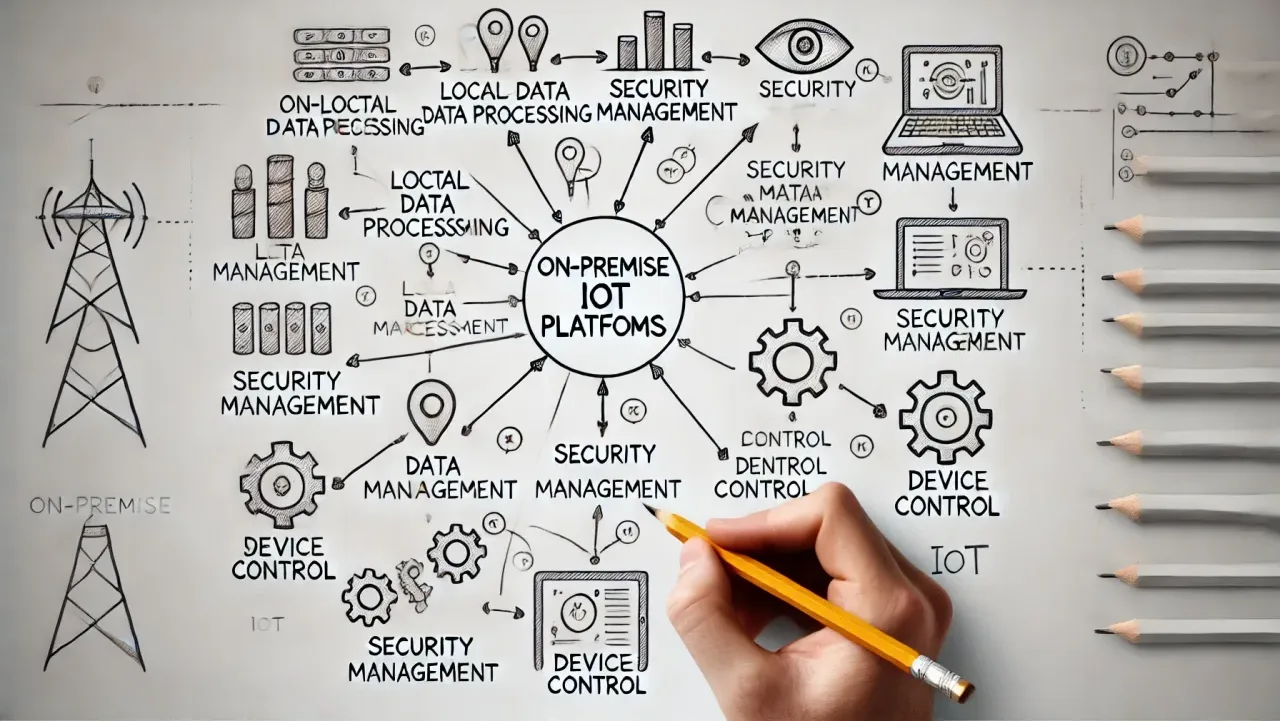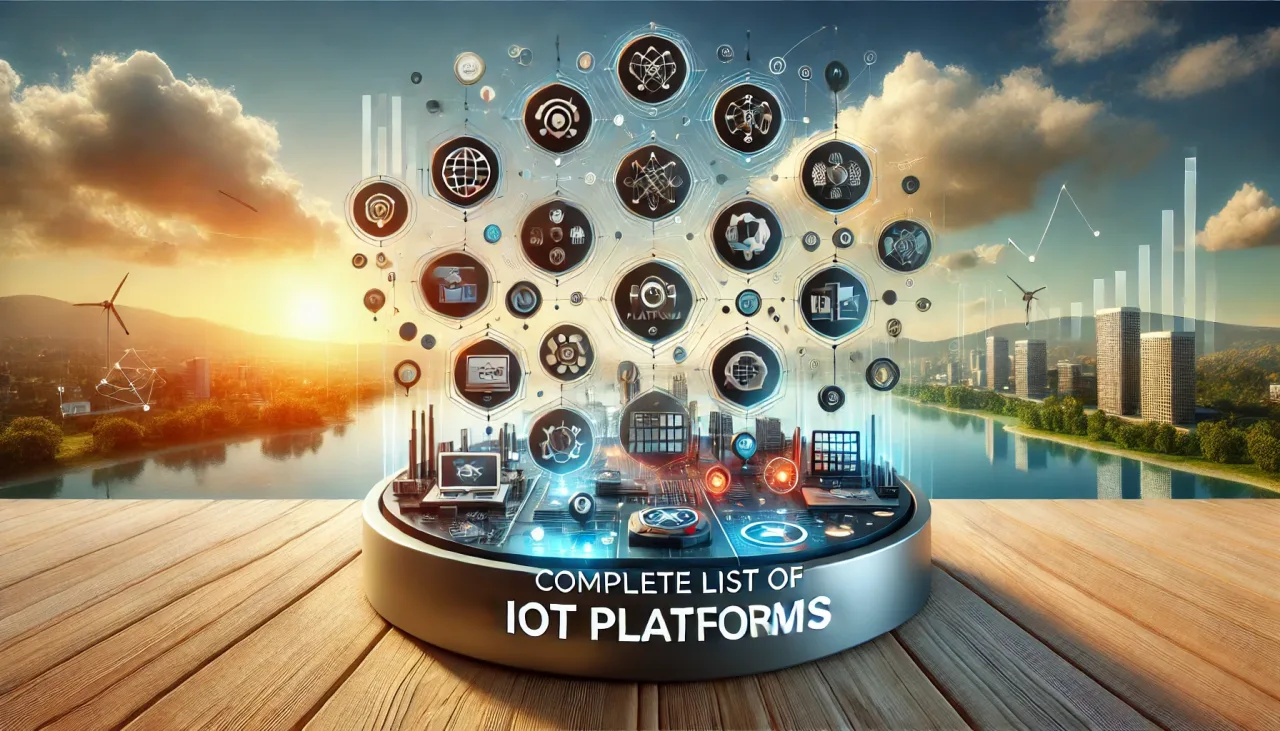In this Article
Introduction
What is an IoT Platform?
An IoT platform is a comprehensive suite of technologies that enable the provisioning, management, and automation of connected devices within the IoT ecosystem. These platforms provide the necessary tools and infrastructure to connect, manage, and analyze data from IoT devices, facilitating seamless communication and data flow.
Key Features of Our IoT Solutions:
- Custom Solutions: Tailored IoT platforms to fit specific business requirements, ensuring optimal performance and efficiency.
- Advanced Security: Implementing robust security measures to protect data and devices from cyber threats.
- Scalable Architecture: Designing scalable solutions that can grow with your business, accommodating increasing numbers of devices and data volume.
By understanding the complete list of IoT platforms and leveraging the right solutions, businesses can drive innovation, improve efficiency, and achieve their IoT objectives.
Types of IoT Platforms
There are several types of IoT platforms, each designed to serve specific needs and industries. Understanding these types is crucial for selecting the right platform for your IoT deployment.
Device Management Platforms
Overview: Device management platforms focus on managing the lifecycle of IoT devices, from deployment to decommissioning. These platforms provide tools for provisioning, monitoring, and updating devices.
Key Features:
- Provisioning: Ensuring devices are correctly configured and ready for deployment.
- Monitoring: Keeping track of device status and performance in real-time.
- Firmware Updates: Over-the-air updates to keep devices secure and functional.
Popular Examples:
- AWS IoT Device Management: A comprehensive solution for onboarding, organizing, monitoring, and remotely managing IoT devices.
- Azure IoT Hub Device Provisioning Service: Simplifies the process of connecting and configuring devices securely.
- Google Cloud IoT Core: Supports large-scale device deployment and management with minimal effort.
Connectivity Management Platforms

Ai Image by Dall-E
Overview: Connectivity management platforms facilitate communication between devices and the cloud. These platforms manage network connections to ensure reliable data transmission.
Key Features:
- Protocols: Supporting various communication protocols like MQTT, CoAP, and HTTP.
- Network Management: Managing the network connections to ensure reliable data transmission.
- Bandwidth Optimization: Ensuring efficient use of network resources.
Popular Examples:
- Cisco IoT Control Center: Provides robust connectivity management and advanced security features.
- Ericsson IoT Accelerator: Offers global connectivity management and real-time analytics.
- HPE Universal IoT Platform: Supports multiple connectivity protocols and advanced network management capabilities.
Data Management Platforms
Overview: Data management platforms specialize in collecting, storing, and analyzing IoT data. These platforms provide tools for processing and deriving insights from vast amounts of data generated by IoT devices.
Key Features:
- Data Collection: Gathering data from connected devices.
- Data Storage: Securely storing the collected data for analysis.
- Data Analytics: Using advanced analytics to derive insights from the data.
Popular Examples:
- Google Cloud IoT Core: Integration with Google Cloud’s data analytics services for comprehensive IoT solutions.
- IBM Watson IoT Platform: Provides real-time analytics and visualization tools for monitoring and managing IoT data.
- SAP Leonardo IoT: Leverages SAP’s enterprise resource planning and analytics capabilities for end-to-end IoT solutions.
Application Enablement Platforms
Overview: Application enablement platforms provide tools and frameworks for building IoT applications. These platforms offer APIs, development tools, and user interfaces for creating custom IoT solutions.
Key Features:
- APIs: Providing APIs for integrating IoT data with other systems and applications.
- Development Tools: Offering tools for developing custom IoT applications.
- User Interfaces: Creating dashboards and interfaces for monitoring and managing IoT systems.
Popular Examples:
- Microsoft Azure IoT Central: A fully managed application platform with built-in security and scalability.
- ThingWorx by PTC: A comprehensive platform for developing and deploying IoT applications quickly.
- Siemens MindSphere: Provides an open cloud platform with advanced analytics and development tools.
End-to-End IoT Platforms
Overview: End-to-end IoT platforms offer comprehensive solutions covering device management, connectivity, data management, and application enablement. These platforms provide an all-in-one solution for managing the entire IoT ecosystem.
Key Features:
- Comprehensive Management: Providing tools for managing all aspects of IoT deployment.
- Seamless Integration: Ensuring seamless integration between different components of the IoT ecosystem.
- Advanced Security: Implementing robust security measures to protect data and devices.
Popular Examples:
- AWS IoT Core: Supports billions of devices and trillions of messages, ensuring reliable and scalable connectivity.
- IBM Watson IoT Platform: Leverages IBM’s cognitive computing and machine learning technologies for advanced IoT solutions.
- Oracle IoT Cloud: Offers a comprehensive suite of IoT applications and tools for device connectivity, data analysis, and application development.
Specialized IoT Platforms
Overview: Specialized IoT platforms are designed for specific industries or applications, offering tailored solutions that address unique challenges and requirements.
Key Features:
- Industry-Specific Solutions: Providing features and tools specifically designed to meet the needs of particular industries.
- Pre-Configured Applications: Offering pre-configured applications that streamline deployment and reduce the need for extensive customization.
- Enhanced Efficiency: Optimizing performance and efficiency for the targeted applications.
Popular Examples:
- GE Predix: Designed for industrial IoT applications, providing tools for asset performance management and operations optimization.
- Bosch IoT Suite: Offers solutions for smart homes, smart cities, and industrial IoT.
- Hitachi Lumada: Focuses on industrial IoT, offering advanced analytics and asset management tools.
Open Source IoT Platforms
Overview: Open source IoT platforms provide flexible and customizable solutions that can be tailored to meet specific needs. These platforms offer the source code, allowing developers to modify and extend the platform’s capabilities.
Key Features:
- Customizability: Offering extensive customization options through open source code.
- Community Support: Supported by a community of developers who contribute to the platform’s development and improvement.
- Cost-Effective: Providing a cost-effective solution with no licensing fees.
Popular Examples:
- ThingsBoard: An open source IoT platform with advanced data visualization and device management capabilities.
- Kaa IoT Platform: A flexible and highly customizable platform for building and managing IoT applications.
- Mainflux: An open source platform for IoT and edge computing with robust security and scalability features.
Cloud-Based IoT Platforms
Overview: Cloud-based IoT platforms leverage cloud computing technologies to provide scalable and flexible solutions for managing IoT devices and data. These platforms offer the benefits of cloud infrastructure, including scalability, flexibility, and cost-efficiency.
Key Features:
- Scalability: Providing scalable solutions capable of handling large volumes of data and numerous devices. Scalability is key for managing expanding IoT deployments effectively.
- Flexibility: Offering flexible deployment options and seamless integration with other cloud services. Flexible platforms support a variety of use cases and environments.
- Cost-Efficiency: Reducing infrastructure costs by leveraging cloud resources, leading to significant savings. This approach minimizes expenses while maintaining high performance.
Popular Examples:
- AWS IoT Core: A cloud-based platform that supports billions of devices and trillions of messages. It ensures reliable and secure communication between connected devices.
- Microsoft Azure IoT Hub: Integrates with other Azure services for a comprehensive cloud-based IoT solution. It provides reliable communication, extensive data processing, and real-time analytics.
- Google Cloud IoT Core: Provides scalable data management and analytics services through Google Cloud. It ensures efficient data handling and real-time insights.
On-Premise IoT Platforms

Ai Image by Dall-E
Overview: On-premise IoT platforms are deployed locally within an organization’s infrastructure. These platforms offer greater control over data and security, making them suitable for industries with stringent regulatory requirements.
Key Features:
- Data Control: Providing full control over data storage and processing.
- Enhanced Security: Implementing robust security measures to protect sensitive data.
- Compliance: Ensuring compliance with industry-specific regulations and standards.
Popular Examples:
- Siemens MindSphere: Offers on-premise deployment options for industries with strict data security requirements.
- ThingWorx by PTC: Provides on-premise solutions for industrial IoT applications.
- Bosch IoT Suite: Supports on-premise deployments for smart city and industrial IoT applications.
Conclusion
The IoT landscape is diverse, with numerous platforms designed to cater to different needs and industries. Understanding the various types of IoT platforms and their key features is essential for selecting the right solution for your IoT deployment. Whether you need a device management platform, a connectivity management platform, a data management platform, an application enablement platform, or an end-to-end solution, there are numerous options available to meet your specific requirements. By thoroughly evaluating the Complete List of IoT Platforms, you can ensure that your IoT system is both efficient and scalable. Additionally, choosing the right platform from the Complete List of IoT Platforms can significantly enhance data security and integration capabilities, making it easier to achieve your business objectives.
How We Can Help
At Minnovation, we specialize in providing comprehensive IoT solutions tailored to meet the unique needs of your business. Our expertise in various IoT platforms ensures seamless integration, robust security, and enhanced performance. We offer consultation, development, and management services to help you harness the full potential of IoT technology. By referencing the Complete List of IoT Platforms, we ensure you select the most suitable options. Whether you are looking to implement a new IoT system or optimize your existing infrastructure, our team is here to support you every step of the way. For more details please visit our website or Contact us.
Reference
Related Blog Posts
How Smart Cities Connect: Getting Started with Edge AI and IoT Technology
How to Get Started with Edge AI and IoT Technologies in Smart Cities: Overcoming Integration Challenges In recent years, the concept of smart cities has evolved from a futuristic Read More
5 Step Strategy: Ensuring Security and Privacy in 15-Minute Smart Cities
Introduction Ensuring security and privacy in 15-minute smart cities is a critical challenge as urban areas become increasingly connected through IoT and edge AI technologies. These cities aim to Read More
What is a smart city and the challenge of legacy systems
How to Get Started with Integrating Legacy Systems in Smart Cities Smart cities are transforming urban landscapes by leveraging technology to improve the quality of life for residents. However, Read More




